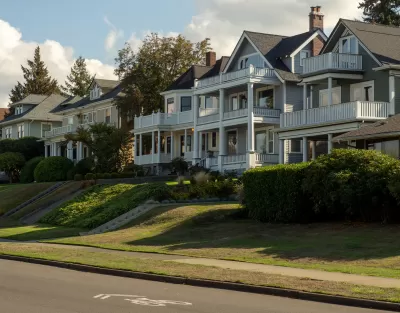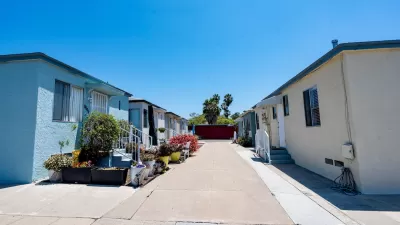The new law will prevent local governments from prohibiting the development of coliving multifamily development through zoning and other regulations.

Washington Governor Jay Inslee signed a bill in March that clears the way for coliving. With rents across the state soaring and supply of affordable housing far below demand, the new law is aimed at boosting versatile and affordable options across the state, reports Lauren Rendahl with the Spokesman-Review.
The new law, which will go into effect in June, requires cities and counties to allow coliving permitting housing on residential lots where at least six multifamily housing units are permitted by January 2026 and prohibit regulations against their development.
“Additionally, local governments cannot mandate off-street parking within half a mile of a major transit stop or require more than one off-street parking space per sleeping unit for this housing style,” Rendahl writes.
Coliving, also known as cohousing, developments are a type of housing that is communal in nature, typically involving multiple units within a single home or a cluster of single-family homes or condos on a single lot that share common spaces. But their development is often prohibited by local zoning laws, including restrictions on the number of units per parcel, the relationships or number of occupants per unit, and off-street parking minimums (neighborhood residents often oppose these type of developments out of concern for increased demand for street parking). That said, major cities across the country, including Washington, D.C. and Houston, have been experimenting with cohousing in recent years as a way to provide affordable living options to residents.
FULL STORY: Co-living residential housing is coming to Washington after Inslee signs bill into law

Planetizen Federal Action Tracker
A weekly monitor of how Trump’s orders and actions are impacting planners and planning in America.

San Francisco's School District Spent $105M To Build Affordable Housing for Teachers — And That's Just the Beginning
SFUSD joins a growing list of school districts using their land holdings to address housing affordability challenges faced by their own employees.

The Tiny, Adorable $7,000 Car Turning Japan Onto EVs
The single seat Mibot charges from a regular plug as quickly as an iPad, and is about half the price of an average EV.

Seattle's Plan for Adopting Driverless Cars
Equity, safety, accessibility and affordability are front of mind as the city prepares for robotaxis and other autonomous vehicles.

As Trump Phases Out FEMA, Is It Time to Flee the Floodplains?
With less federal funding available for disaster relief efforts, the need to relocate at-risk communities is more urgent than ever.

With Protected Lanes, 460% More People Commute by Bike
For those needing more ammo, more data proving what we already knew is here.
Urban Design for Planners 1: Software Tools
This six-course series explores essential urban design concepts using open source software and equips planners with the tools they need to participate fully in the urban design process.
Planning for Universal Design
Learn the tools for implementing Universal Design in planning regulations.
Smith Gee Studio
City of Charlotte
City of Camden Redevelopment Agency
City of Astoria
Transportation Research & Education Center (TREC) at Portland State University
US High Speed Rail Association
City of Camden Redevelopment Agency
Municipality of Princeton (NJ)





























